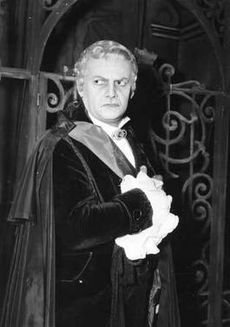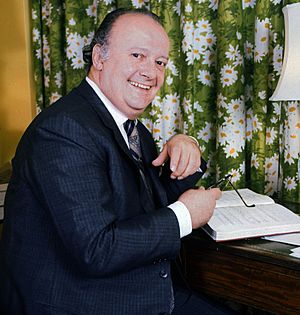Tito Gobbi facts for kids
Tito Gobbi (born October 24, 1913 – died March 5, 1984) was a famous Italian opera singer. He was a baritone, which is a male singing voice that is deeper than a tenor but higher than a bass. Gobbi was known all over the world for his amazing voice and acting skills.
He first sang in an opera in 1935 in a town called Gubbio. He played Count Rodolfo in Bellini's La sonnambula. Soon, he was performing in all the big opera houses in Italy. By the time he stopped singing in 1979, he had learned almost 100 different opera roles! These roles included characters from famous operas by Mozart, Rossini, Verdi, and Puccini.
Tito Gobbi also appeared in over 25 films, either singing or acting. Later in his career, he started directing operas. He directed about ten different operas, which were performed nearly 35 times in Europe and North America. He was especially active in Chicago for the Lyric Opera of Chicago.
Gobbi and his wife, Tilde De Rensis, had a daughter named Cecilia. She now runs a group called the "Associazione Musicale Tito Gobbi." This group works to remember and celebrate her father's important work in opera. Tito Gobbi was also the brother-in-law of another famous opera singer, Boris Christoff, who was a bass from Bulgaria.
Tito Gobbi retired in 1979 and passed away in Rome in 1984 when he was 70 years old.
Contents
Early Life and Training
Tito Gobbi was born in a town called Bassano del Grappa in Italy. He first started studying law at the University of Padua. While he was there, a family friend, Baron Agostino Zanchetta, heard him sing. The baron was very impressed and told Gobbi he should study singing.
So, in 1932, Gobbi moved to Rome to learn from Giulio Crimi. Crimi was a well-known Italian tenor (a high male singing voice) from an earlier time. He had even sung in the first performances of some of Puccini's operas. When Gobbi had his first singing audition, a woman named Tilde De Rensis played the piano for him. She was the daughter of a musicologist (someone who studies music) named Raphael De Rensis. In 1937, Tito and Tilde got married.
A Career in Opera
Starting Out
After his first opera performance in 1935, Tito Gobbi quickly gained experience. In 1937, he sang the role of Germont in La traviata in Rome. He also worked at the famous La Scala opera house in Milan in 1935–1936 as an understudy, which means he learned roles in case the main singer couldn't perform. His first time on stage there was in an opera called Orsèolo.
In 1942, he officially debuted at La Scala as Belcore in Donizetti's L'elisir d'amore. He worked closely with a conductor named Tullio Serafin. Under Serafin's guidance, Gobbi prepared many important roles that would become famous for him later, like Scarpia, Rigoletto, and Simon Boccanegra. He also performed at the Rome Opera starting in 1938, singing roles like Sharpless in Madama Butterfly.
During these years, Gobbi also performed in other important Italian opera houses. In Venice, he sang Marcello in La bohème in 1941. In Florence, he sang Hidraot in Gluck's Armide in 1941. He also performed in Trieste in 1942 and 1943, including the main character in L'Orfeo.
In 1942, Gobbi performed his first Falstaff at La Scala. In the same year, he also sang the main role in Alban Berg's Wozzeck. These performances made him very well-known in Italy. He sang Wozzeck again later in Italy and in Vienna.
International Success
After World War II, Tito Gobbi's career really took off around the world. In 1948, he performed at the San Francisco Opera. In 1950, he sang for the first time at London's Royal Opera House, Covent Garden. He also performed with the Lyric Opera of Chicago from 1954 to 1974.
His debut at the Metropolitan Opera in New York City was in 1956, where he sang Scarpia in Tosca. His last performance at Covent Garden was also in 1974. People there loved him for his beautiful singing, his strong acting, and his deep understanding of the characters.
There was one time in 1955 when Gobbi was supposed to sing Iago in Verdi's Otello at Covent Garden. He was late for a rehearsal, and the new music director, Rafael Kubelík, decided to remove him from the show. Another singer, Otakar Kraus, took over the role. However, a few weeks later, Gobbi and Kubelik met and Kubelik apologized. Most people felt that while Kubelik was trying to make sure singers were on time, he picked the wrong person because Gobbi was usually very professional. Gobbi was back at Covent Garden the next summer, singing in Rigoletto.
Gobbi in Films
Early in his career, Tito Gobbi appeared in many movies between 1937 and 1959. Some of these were filmed operas, like The Barber of Seville in 1946. He also acted in other types of movies. For example, in 1946, he was in Avanti a lui tremava tutta Roma ("Before Him All Rome Trembled"). This movie was about opera performers in Rome who were part of the Italian resistance movement against the Germans during World War II.
In 1949, he was in a popular British movie called The Glass Mountain, which made him known to many people. In 1950, he played himself in the British film Soho Conspiracy. By the time he passed away, Gobbi had been in about 25 films, both singing and speaking. He even provided the singing voice for actor Anthony Quinn in the 1953 film Cavalleria rusticana.
Gobbi as a Director
In the 1960s, Gobbi started directing operas. A famous example was his production of Verdi's Simon Boccanegra at Covent Garden in December 1965. He had actually directed it for Chicago a little earlier. He also sang the main role in three of the productions he directed, with the last one being in Rome in 1975. Many people say that Gobbi's love for this opera, both as a singer and director, was one of his greatest achievements.
Between 1965 and 1982, he directed about ten different operas. Most often, he directed Tosca. He also directed The Barber of Seville three times in Chicago. He directed Otello three times in different cities, and Gianni Schicchi several times in places like Florence, Edinburgh, Chicago, Zurich, and Monaco. In total, he directed these ten operas nearly forty times for opera companies in Europe and North America. He directed nine of the ten operas for the Lyric Opera of Chicago.
Famous Roles

Tito Gobbi said he sang the part of Scarpia in Puccini's Tosca "nearly a thousand times." One very important performance was in February 1964 at the Royal Opera House in London. This production was directed by Franco Zeffirelli and was a huge event around the world. The famous Soprano Maria Callas sang the main role of Tosca.
The second act of this performance was shown live on British television on February 9, 1964. Many people consider it one of the most amazing and dramatic opera performances ever recorded. You can still watch it today on DVD.
Gobbi and Callas had sung Tosca together before. They made a classic recording of the opera in 1953 in Milan. Giuseppe Di Stefano sang Cavaradossi, and Victor de Sabata conducted. This 1953 recording is considered by many to be the best complete opera recording ever made. It is still available today. Gobbi was a close friend and admirer of Callas. He often spoke about working with her, saying in his book that "with Maria it was not performing but living."
He was also very famous for his many performances as Iago and Falstaff. You can find many of these performances on CD. Less known, but still impressive, are his performances in Mozart operas, especially the main role in Don Giovanni and the Count in The Marriage of Figaro.
In 1968, he was part of the first opera ever shown on Australian television. It was Tosca, with Marie Collier as Tosca and Donald Smith as Cavaradossi.
Selected Recordings
- Berg: Wozzeck (1954)
- Donizetti: L'elisir d'amore (1952)
- Donizetti: Lucia di Lammermoor (with Callas, 1953)
- Giordano: Fedora (1969)
- Leoncavallo: Pagliacci (with Callas, 1954)
- Leoncavallo: Pagliacci (1960)
- Franco Leoni: L'oracolo (1975)
- Mascagni: Cavalleria rusticana (1966)
- Mozart: Don Giovanni (1950)
- Mozart: The Marriage of Figaro (live from Covent Garden, 1963)
- Puccini: La bohème (1961)
- Puccini: Gianni Schicchi (1958)
- Puccini: Gianni Schicchi (1976)
- Puccini: Madama Butterfly (1954)
- Puccini: La Fanciulla del West (1956)
- Puccini: Il tabarro (1955)
- Puccini: Tosca (with Callas, 1953)
- Puccini: Tosca, Act 2. (Live video from Royal Opera House, 1964)
- Puccini: Tosca (with Callas, 1964)
- Puccini: Le Villi (1979)
- Rossini: Il barbiere di Siviglia (with Callas, 1957)
- Richard Strauss: Salome (1952)
- Verdi: Aida (with Callas, 1955)
- Verdi: Un ballo in maschera (with Callas, 1956)
- Verdi: Don Carlos (1954)
- Verdi: Don Carlos (1958)
- Verdi: Falstaff (1956)
- Verdi: Nabucco (1965)
- Verdi: Otello (1960)
- Verdi: Rigoletto (with Callas, 1955)
- Verdi: Simon Boccanegra (1957)
- Verdi: La traviata (1955)
Selected Films
- Forbidden Music (1942)
- Before Him All Rome Trembled (1946)
- O sole mio (1946)
- The Barber of Seville (1947)
- Mad About Opera (1948)
- The Lady of the Camellias (1947)
- The Glass Mountain (1949)
- The Force of Destiny (1950)
- Soho Conspiracy (1950)
- The Firebird (1952)
See also
 In Spanish: Tito Gobbi para niños
In Spanish: Tito Gobbi para niños
 | William L. Dawson |
 | W. E. B. Du Bois |
 | Harry Belafonte |


